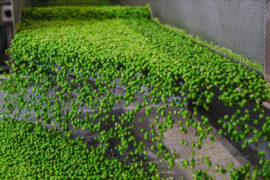Food supply contamination issues, pesticides, product weights, mandatory origin labeling, promotion programs and additional timely subjects were covered in the PROFEL Newsletter issued on May 28 by the Brussels-based European Association of Fruit and Vegetable Processors. Excerpts of a selected number of the briefs follow:
Contaminants – Chlorate
In late 2013 a method was developed for measuring Chlorate in foodstuffs, and samples of frozen vegetables placed on the German market were analyzed to determine levels of the chemical compound. The default MRL of 0.01 mg/kg set by EU pesticide regulations has been applied for frozen vegetables, which resulted in various product recalls.
Analysis and samples have confirmed that legitimate washing and blanching vegetables in chlorinated water led to Chlorate residues on the frozen products. PROFEL met the European Commission in May to ask that reference levels be urgently put in place for intra-community trade. A decision is expected to be taken during the Standing Committee for Pesticides meeting on June 12 and 13.
Drained Net Weight
The European Commission has proposed the WELMEC methodology 6.8 as the reference method to determine drained net weight in the context of the Food Information to Consumers regulation. PROFEL met the European Commission in April to ask that frozen vegetables be exempted from the scope of any legislation on this topic, since analysis has shown that the WELMEC methodology is neither reliable nor reproducible for frozen vegetable products. The Commission agreed to look into an alternative method put forward by the association.
Minor Uses of Pesticides
The European Commission published its report on minor uses of pesticides in February, proposing a EUR 320,000 budget to set up a coordination platform. The tender for member states to participate in the platform is scheduled to be launched before the summer of 2014.
Mandatory Origin Labeling
The consultant selected by the European Commission to prepare a report on mandatory origin labeling launched a public consultation period in April. PROFEL has made known its position against mandatory origin labeling to all concerned parties. The consultant’s findings are expected to be submitted to the European Commission in July, and the EC report is due to be presented to the European Parliament and Council by December of 2014.
Agricultural Products Promotion
The European Commission published its proposal to reform the EU’s agricultural products promotion policy at the end of 2013. This policy provides the framework for programs including the last campaign to increase consumption of canned and frozen vegetables in Belgium, the Netherlands and France.
PROFEL has had several meetings with members of the European Parliament to address points of concern in the new proposal for the processed fruits and vegetables sector. The final texts, approved by the European Parliament at its plenary session in June, take into account several points raised by sectors, as follows:
- Sweet corn has been added as eligible product for promotion campaigns.
- Co-financing will be organized between the EU and the proposing organization. Co-financing by the member states is no longer foreseen.
- Co-financing rates will be increased, amounting to 70% for simple programs on the internal market; 80% in third countries and for multi-country programs; and up to 85% in the event of a serious market disturbance, or loss of consumer confidence.
Final approval by the Council is still needed before concluding the legislative procedures. The new framework is scheduled to apply as of December 1, 2015. In the meantime, a PROFEL meeting will be organized with those countries interested in participating in future promotions.
School Fruit Scheme
At the beginning of the year the European Commission published the proposal for the reform of the School Fruit Scheme. The new program will bring the fruits and vegetables and milk promotions together under one framework, with a budget of EUR 230 million per school year (EUR 150 million for fruits and vegetables and EUR 80 million for milk, compared to EUR 122 million and EUR 75 million, respectively, in the 2014 budget).
The proposal foresees a focus on two key categories, fresh fruits and vegetables, and milk, each of which is experiencing a declining consumption trend. Member states would have the possibility of occasionally putting the emphasis on other products, such as processed fruits and vegetables, in the context of educational measures.

A PROFEL note setting out the association’s concerns on this approach and drawing attention to the role of processed fruits and vegetables in achieving the objectives of the School Fruit Scheme has been prepared and will be shared with decision-makers.
PROFEL represents over 500 companies in 12 European countries, through national associations or direct company membership. Its member companies annually produce approximately 3.1 million tons of frozen vegetables, 2 million tons of canned vegetables, 1 million tons of canned deciduous fruits and compotes, 385,000 tons of fruit preserves and jams, and 35,000 tons of dried vegetables.
Readers interested in reviewing PROFEL’s entire May 28, 2014, newsletter may do so by visiting www.profel-europe.eu.





